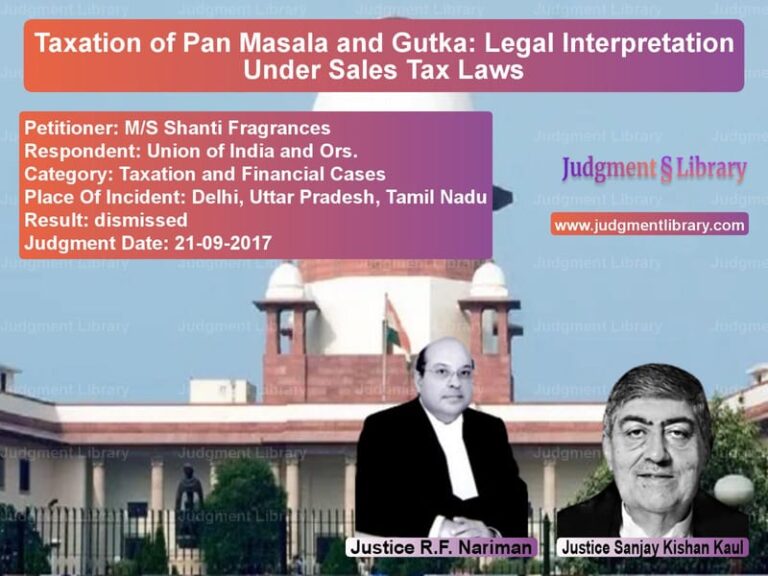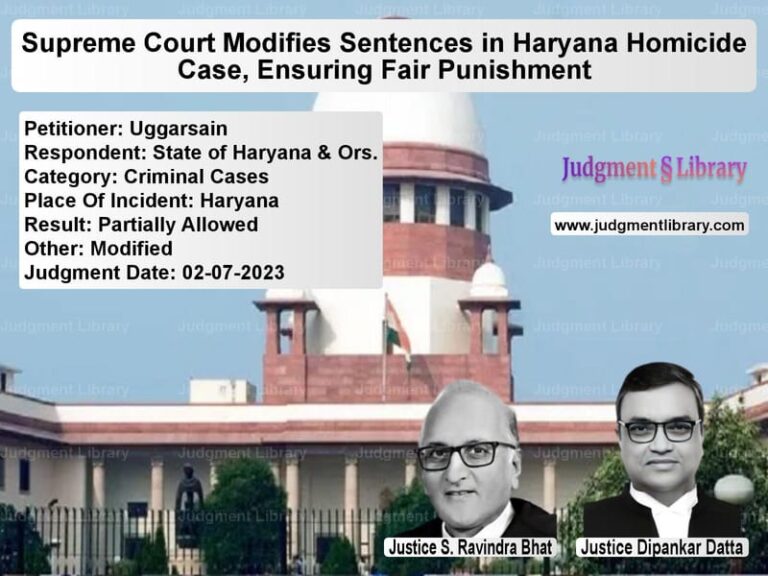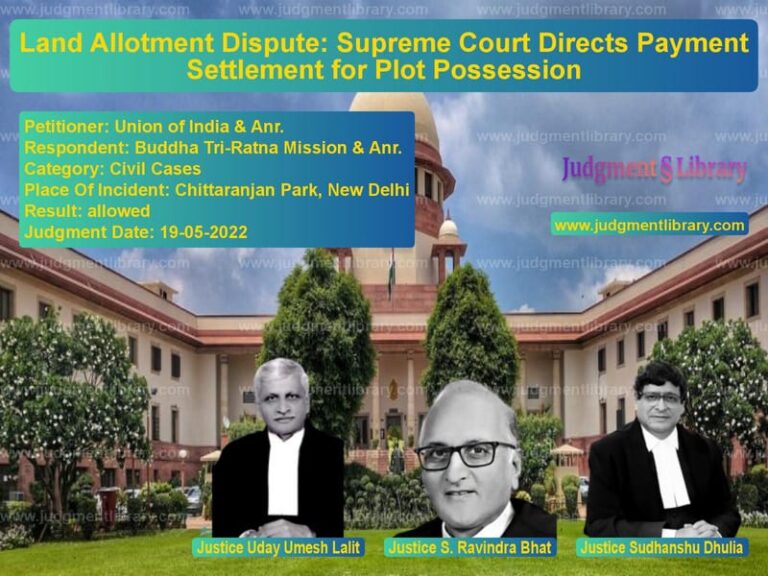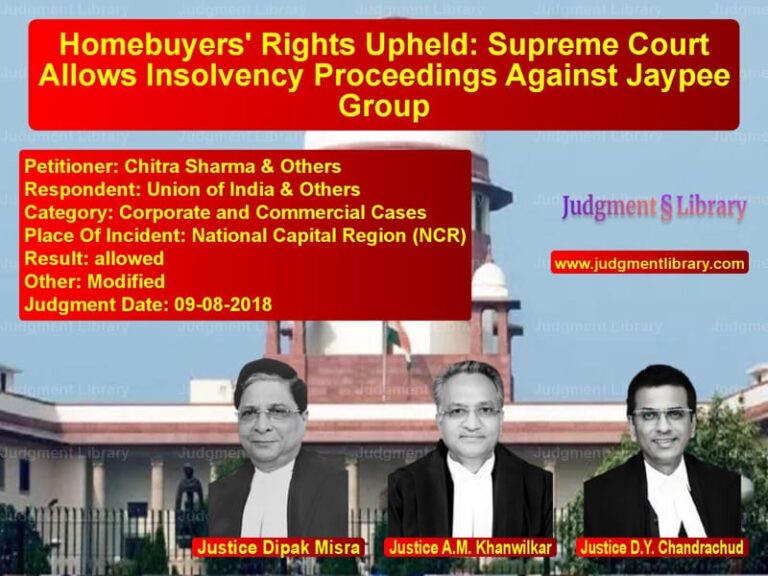Supreme Court Rules on Arbitration in Insurance Dispute
The Supreme Court of India, in its judgment dated November 13, 2019, delivered a significant ruling in the case of The Oriental Insurance Co. Ltd. & Anr. vs. Dicitex Furnishing Ltd.. This case addressed the crucial issue of whether an insurance claim dispute could be referred to arbitration when a discharge voucher had been signed under alleged coercion. The ruling has significant implications for insurance contract disputes, arbitration proceedings, and consumer protection in India.
Background of the Case
The respondent, Dicitex Furnishing Ltd., had obtained a Standard Fire and Special Peril Policy from The Oriental Insurance Co. Ltd. to cover its stock of goods in three separate godowns in Thane, Maharashtra. The policy had a total sum insured of ₹13 crores and included an arbitration clause.
On May 25, 2012, a fire broke out at night on the ground floor of the building occupied by RFCL, which then spread to the first floor, engulfing all three godowns belonging to Dicitex. The fire completely destroyed the stock stored in these warehouses. Dicitex promptly informed the insurer on May 26, 2012, and lodged a claim for ₹14,88,14,327, which included ₹13,52,85,752 for material loss and ₹1,35,28,575 for overheads.
Petitioner’s (Insurance Company) Arguments
- The discharge voucher signed by Dicitex indicated that the claim had been settled fully and finally, which precluded arbitration.
- Since Dicitex had voluntarily accepted the final settlement amount of ₹7,16,30,148, the arbitration clause could not be invoked.
- As per precedent set by Boghara Polyfab vs. National Insurance Co., once a claim has been discharged through a settlement, there is no arbitrable dispute.
- The insurance company followed due process, and a second survey was conducted by a Chartered Accountant to reassess the loss amount.
Respondent’s (Dicitex Furnishing Ltd.) Arguments
- The discharge voucher was signed under economic duress as the company was under financial distress and needed immediate funds to cover liabilities.
- The insurer delayed claim settlement for over two years, forcing Dicitex to accept a much lower amount than initially assessed by the surveyor.
- The insurance company initially appointed a surveyor who assessed the loss at ₹12.93 crores, but later relied on another report that reduced the loss estimate to ₹7.16 crores.
- The arbitration clause should remain enforceable as the settlement was not made voluntarily but under coercion.
Supreme Court’s Observations
- The Court acknowledged that Dicitex had raised continuous concerns over the delay in claim settlement.
- It recognized that prolonged delays in claim settlements could lead to financial distress, making claimants vulnerable to coercion.
- The fact that Dicitex accepted the payment with a signed discharge voucher under financial distress did not automatically invalidate its right to arbitration.
- The Court cited Master Construction vs. Union of India to emphasize that mere signing of a discharge voucher does not bar a claim if there is evidence of coercion or economic duress.
Final Judgment
The Supreme Court upheld the Bombay High Court’s decision to appoint an arbitrator. It ruled that:
- The discharge voucher did not preclude arbitration as there was prima facie evidence of financial distress and coercion.
- The dispute over the claim amount was arbitrable and should be decided by the arbitrator.
- The case was remanded for arbitration proceedings under the terms of the insurance policy.
Impact of the Judgment
- Strengthens Consumer Protection: The judgment ensures that insurance claimants cannot be forced into accepting unfair settlements under financial pressure.
- Clarifies Arbitration in Insurance Disputes: The ruling reinforces that arbitration clauses in insurance contracts remain enforceable even if a claim settlement has been signed under coercion.
- Encourages Fair Practices: The decision compels insurance companies to conduct fair and transparent claim settlements without exploiting policyholders.
Conclusion
The Supreme Court’s decision in The Oriental Insurance Co. Ltd. vs. Dicitex Furnishing Ltd. is a landmark ruling in insurance contract law and arbitration. It underscores the principle that coercion and financial duress must be considered when evaluating claim settlements and reinforces the right to arbitration in disputed insurance claims.
Petitioner Name: The Oriental Insurance Co. Ltd..Respondent Name: Dicitex Furnishing Ltd..Judgment By: Justice Arun Mishra, Justice S. Ravindra Bhat.Place Of Incident: Thane, Maharashtra.Judgment Date: 13-11-2019.
Don’t miss out on the full details! Download the complete judgment in PDF format below and gain valuable insights instantly!
Download Judgment: The Oriental Insuran vs Dicitex Furnishing L Supreme Court of India Judgment Dated 13-11-2019.pdf
Direct Downlaod Judgment: Direct downlaod this Judgment
See all petitions in Commercial Insurance Disputes
See all petitions in Insurance Settlements
See all petitions in Third-Party Insurance
See all petitions in Judgment by Arun Mishra
See all petitions in Judgment by S Ravindra Bhat
See all petitions in allowed
See all petitions in Remanded
See all petitions in supreme court of India judgments November 2019
See all petitions in 2019 judgments
See all posts in Insurance Cases Category
See all allowed petitions in Insurance Cases Category
See all Dismissed petitions in Insurance Cases Category
See all partially allowed petitions in Insurance Cases Category







